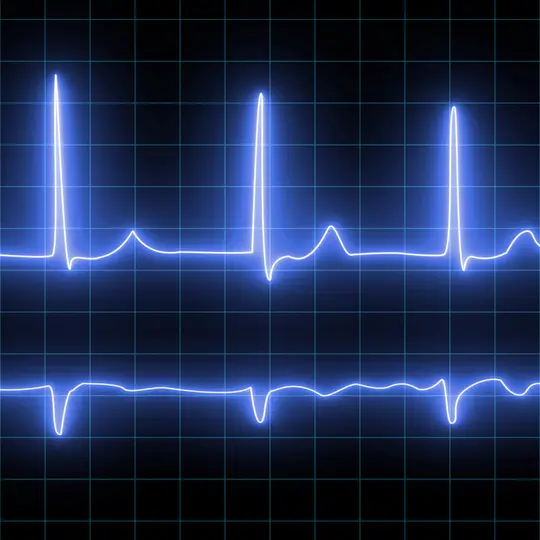1 of 7 / Overview
View All
What Is Atrial Fibrillation?
Atrial fibrillation, or AFib, is a quivery, fluttery heartbeat. You might also hear the doctor call it arrhythmia.
The Costs of Atrial Fibrillation (AFib)
If you have AFib, treating it cuts your risk of having a stroke. But it can be costly, even if you have insurance.
Latest Research on Atrial Fibrillation
Today, researchers are still hard at work on finding ways to treat, manage, and prevent AFib and its complications.
Which Type of Atrial Fibrillation Do You Have?
AFib doesn’t so much have types as it has durations. Doctors classify it by how long it lasts, or what causes it.
2 of 7 / Causes & Risks
View All
Causes, Risk Factors, and Triggers
The basic cause of AFib is disorganized signals that make your heart's two upper chambers squeeze very fast and out of sync.
AFib and Diabetes: What’s the Link?
Studies have found that both type 1 and type 2 diabetes likely raise your risk of developing AFib.
What's the Link Between AFib and Thyroid Disease?
If you have hyperthyroidism, you have a much higher chance of getting AFib. And the odds go up as you get older.
Does an Endocrine Disorder Raise Your AFib Risk?
There are dozens of endocrine disorders, but a few are considered especially strong risk factors for AFib.
3 of 7 / Symptoms
View All
What Are the Symptoms of Atrial Fibrillation?
If your heart races rather than beats and the feeling lasts for a few minutes, that’s a sign you might have AFib.
Atrial Fibrillation in Younger People
AFib also affects younger people. It can even affect teens and children, although less frequently.
Atrial Fibrillation in Older Adults
Being older raises your chances for AFib. Older people are also more likely to have other conditions that raise AFib risk.
Atrial Fibrillation in the Black American Population
You’re less likely to get AFib if you’re Asian, Black, or Hispanic in America than if you’re white.
4 of 7 / Tests & Diagnosis
View All
How Atrial Fibrillation Is Diagnosed
AFib may or may not cause symptoms. Your doctor could find it during a regular physical.
Transesophageal Echocardiogram
To help diagnose AFib, your doctor may use a transesophageal echocardiogram to see how blood flows through heart valves.
Newly Diagnosed With AFib: What to Know
Studies show that people with AFib who understand their condition and what it means to them have fewer symptoms.
Your Atrial Fibrillation Medical Team
If you have AFib, you'll need help keeping your heart in a normal rhythm. Various specialists will make up your AFib team.
5 of 7 / Treatment
View All
What Are the Treatments for AFib?
Treatments such as medications, nonsurgical procedures, and surgery can slow your heartbeat and bring it back into a normal rhythm.
What Is HAS-BLED?
Your HAS-BLED score tells the doctor how to manage your care. This way, everyone who has AFib is not treated the same way.
Heart Rate Control for Atrial Fibrillation
Heart rate control is a key way to manage atrial fibrillation. Doctors consider it one of the four pillars of AFib care.
Rhythm Control Strategies for Atrial Fibrillation
One way to control AFib is to take rhythm control medication, which helps your heart return to and stay in a normal rhythm.
6 of 7 / Living With
View AllTips for Living With AFib
Life with AFib has its challenges. But with the right treatment and lifestyle changes, you can stay active and energetic.
How to Stop an AFib Episode
You may be able to take some steps to help ease AFib symptoms when they start.
Is Taking Supplements OK When You Have AFib?
Talk to your doctor about supplements before you start taking them, to make sure you don't cause problems with your meds.
AFib: Why Weight Loss Helps
If you’re obese -- meaning you have a body mass index (BMI) of 30 or higher -- you’re twice as likely to have AFib.
7 of 7 / Complications
View AllComplications of Atrial Fibrillation
AFib is a problem with your heart’s rhythm. That can cause serious health complications.
When AFib Gets Worse
Your AFib is likely getting worse If you notice your episodes are more frequent, last longer, or meds don’t help as much.
AFib and Coronary Artery Disease: What's the Link?
The connection and difference between atrial fibrillation and coronary artery disease can be confusing.
AFib and Stroke
Some studies show that people who have AFib are about five times more likely to get a stroke than people who don't have it.
Suggested Reads about Atrial Fibrillation
Drugs That Treat Atrial Fibrillation
Medicines help many people with AFib get their heart rate and rhythm under control. They can also lower the chances of a stroke. There are many types of medicines that can help -- here’s a look at how they work and how they might make you feel.
Listen to Your Heart: 10 Things to Do If It Isn’t Beating Right
Find out what you should do if your heart isn't beating right.
Careful Consideration: 10 Things to Think About After an Afib Diagnosis
Find out what you need to think about after you're diagnosed with Afib.
Foods for Thought When You Have AFib
Think twice before you eat or drink these foods to help keep your heart healthy.
Top Search Terms for Atrial Fibrillation
8 million+ Physician Ratings & Reviews
Find Doctors and Dentists Near You
You can also search by physician, practice, or hospital name
Related Links
- Atrial Fibrillation Reference
- Atrial Fibrillation Slideshows
- Atrial Fibrillation Quizzes
- Atrial Fibrillation Blogs
- Atrial Fibrillation Videos
- Atrial Fibrillation Medications
- Find a Cardiologist
- Arrhythmia
- Cardiomyopathy
- Heart-Healthy Diet
- Heart Failure
- Hypertension
- Stroke Risks
- Supraventricular Tachycardia
- My Medicine
- Atrial FibrillationOverview
- Atrial FibrillationSymptoms
- Atrial FibrillationCauses
- Atrial FibrillationDiagnosis
- Atrial FibrillationTreatment
- Complications
- Living with